外研版(2019)必修第三册Unit 2 Making a Difference Using language 过去分词作定语课件(共18张PPT)
文档属性
| 名称 | 外研版(2019)必修第三册Unit 2 Making a Difference Using language 过去分词作定语课件(共18张PPT) | 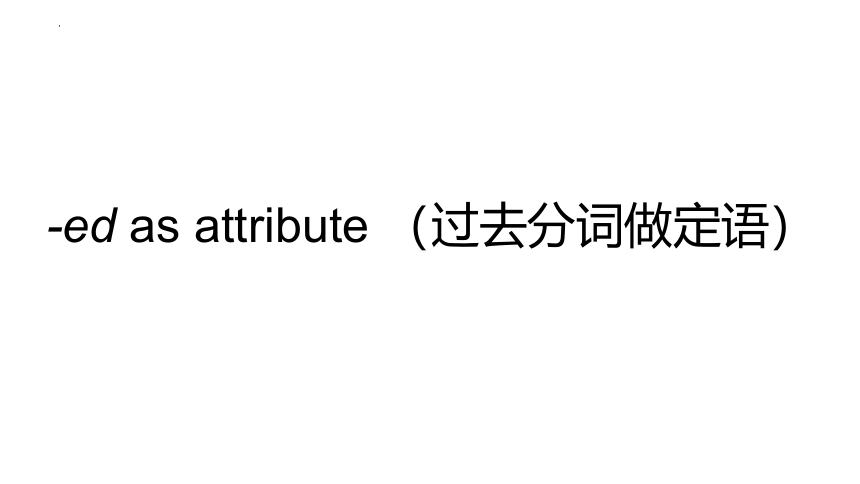 | |
| 格式 | pptx | ||
| 文件大小 | 198.6KB | ||
| 资源类型 | 教案 | ||
| 版本资源 | 外研版(2019) | ||
| 科目 | 英语 | ||
| 更新时间 | 2024-05-22 16:08:27 | ||
图片预览

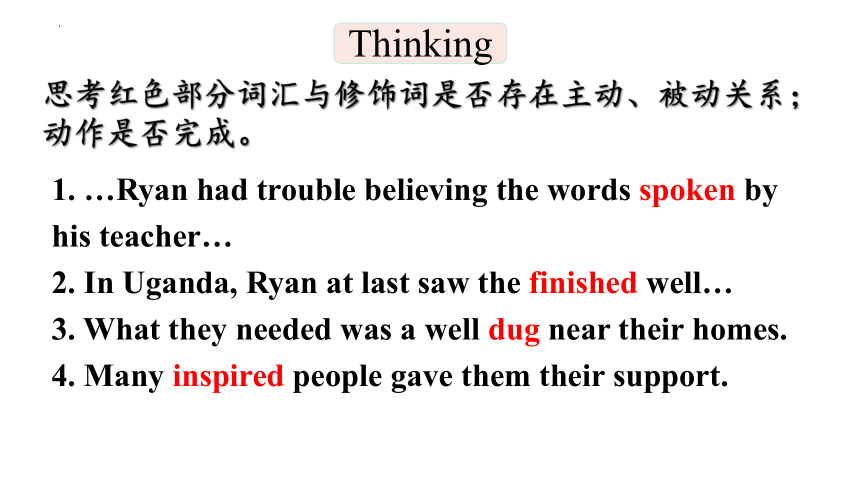
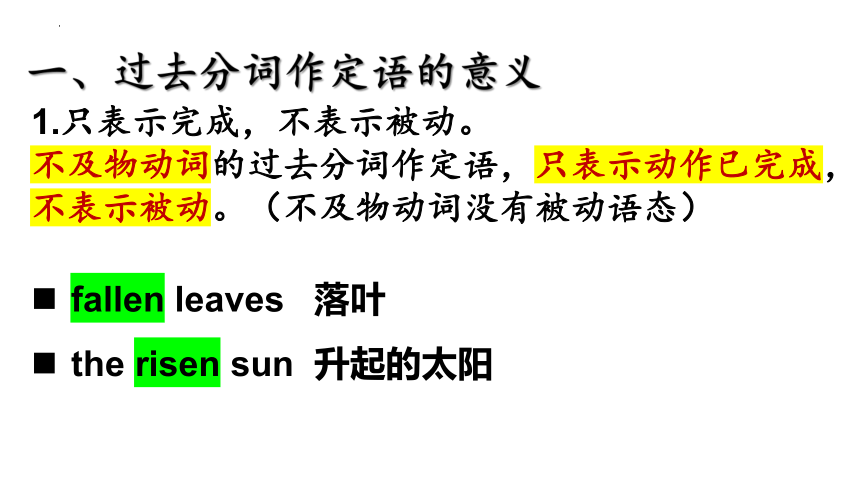
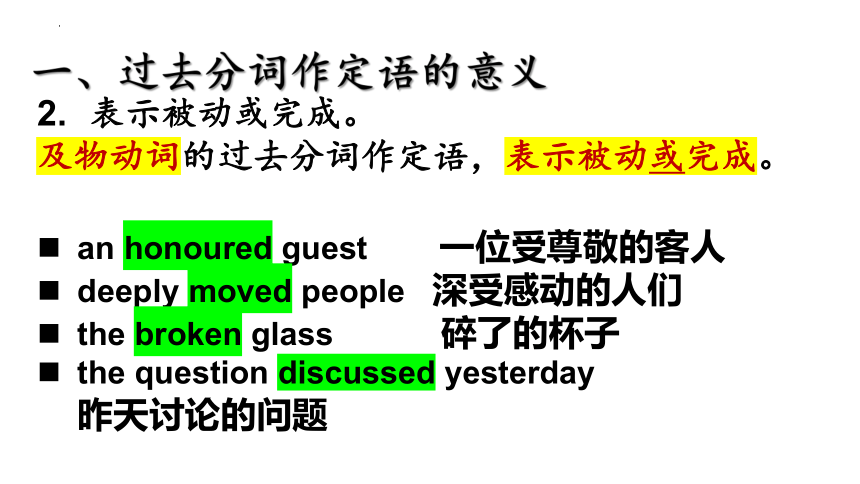
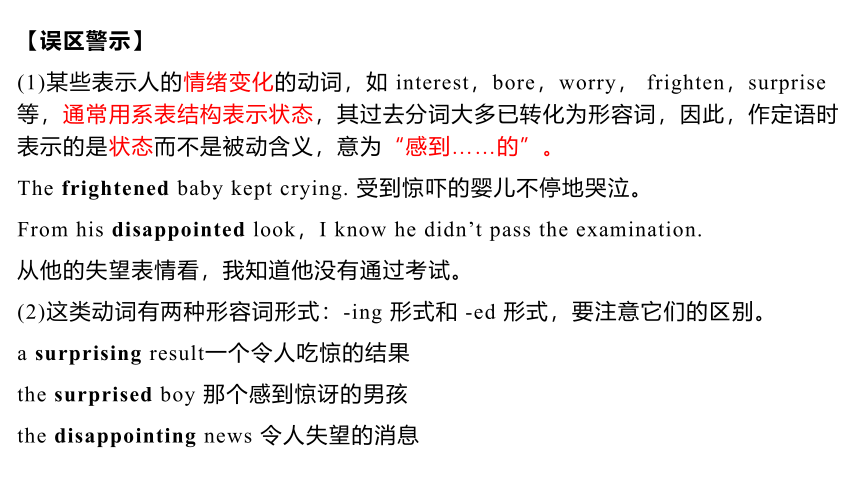
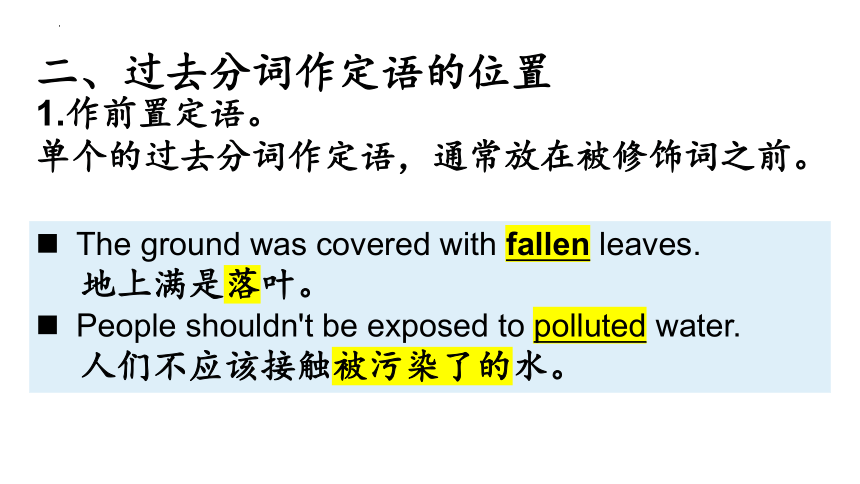
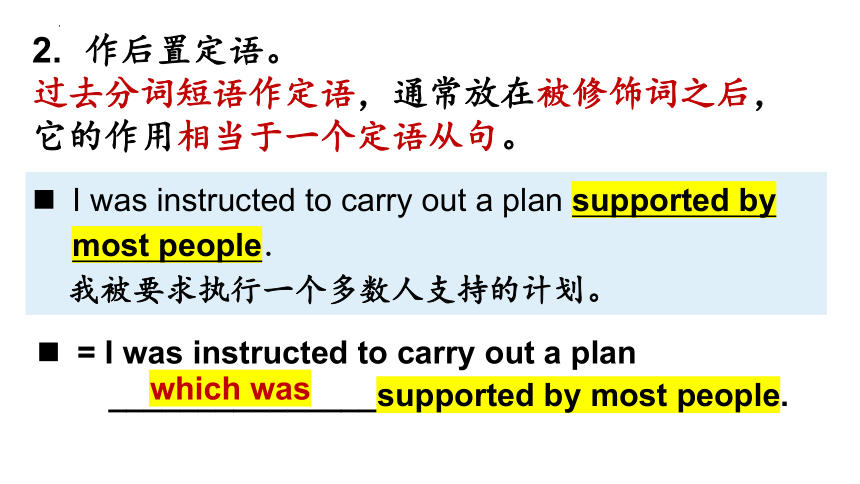
文档简介
(共18张PPT)
-ed as attribute (过去分词做定语)
Thinking
1. …Ryan had trouble believing the words spoken by his teacher…
2. In Uganda, Ryan at last saw the finished well…
3. What they needed was a well dug near their homes.
4. Many inspired people gave them their support.
思考红色部分词汇与修饰词是否存在主动、被动关系;动作是否完成。
一、过去分词作定语的意义
只表示完成,不表示被动。
不及物动词的过去分词作定语,只表示动作已完成,不表示被动。(不及物动词没有被动语态)
fallen leaves 落叶
the risen sun 升起的太阳
一、过去分词作定语的意义
表示被动或完成。
及物动词的过去分词作定语,表示被动或完成。
an honoured guest 一位受尊敬的客人
deeply moved people 深受感动的人们
the broken glass 碎了的杯子
the question discussed yesterday 昨天讨论的问题
【误区警示】
(1)某些表示人的情绪变化的动词,如 interest,bore,worry, frighten,surprise 等,通常用系表结构表示状态,其过去分词大多已转化为形容词,因此,作定语时表示的是状态而不是被动含义,意为“感到……的”。
The frightened baby kept crying. 受到惊吓的婴儿不停地哭泣。
From his disappointed look,I know he didn’t pass the examination.
从他的失望表情看,我知道他没有通过考试。
(2)这类动词有两种形容词形式:-ing 形式和 -ed 形式,要注意它们的区别。
a surprising result一个令人吃惊的结果
the surprised boy 那个感到惊讶的男孩
the disappointing news 令人失望的消息
二、过去分词作定语的位置
作前置定语。
单个的过去分词作定语,通常放在被修饰词之前。
The ground was covered with fallen leaves.
地上满是落叶。
People shouldn't be exposed to polluted water.
人们不应该接触被污染了的水。
作后置定语。
过去分词短语作定语,通常放在被修饰词之后,它的作用相当于一个定语从句。
I was instructed to carry out a plan supported by most people.
我被要求执行一个多数人支持的计划。
= I was instructed to carry out a plan
_______________supported by most people.
which was
(1) The boy _______ (injure) in the accident was taken to hospital.
(2) Some of the people ________(invite) to the party can't come.
(3) Most of the goods ______ (make) in the factory are exported.
(4)The window ________ (break) in the storm has now been repaired.
(5) Have you finished the exercises ______ (give) by Mr. Li
More examples:
=who was injured
injured
=who were invited
invited
=which are made
made
=which was broken
=which were given
broken
given
【学法点拨】
( 1)个别单个的过去分词,如 shown,adopted,left,given,involved, wanted,gained,concerned,provided 等作定语时习惯后置。
After completing and signing it,please return the form to us in the envelope provided.
填完表格并且签名之后,请把表格放入我们提供的信封内送回。
( 2)过去分词修饰 something,everything,anything,nothing,nobody 等不定代词或指示代词those 时必须后置。
Jim sold most of his things. He has hardly anything left in the house.
吉姆卖了他的大部分东西。他没剩什么在房子里了。
三、现在分词与过去分词作定语的区别
两者的最主要区别:
现在分词作定语时, 表示“主动”“正在进行”。
过去分词作定语时, 表示“被动”“已完成”。
三、现在分词与过去分词作定语的区别
He is the only person _______(walk) on the streets.
I am interested in the basketball match ______(hold 举办) in our school.
held
walking
我对(被)在学校举办的比赛很感兴趣。
他是唯一个在街上走的人。
逻辑主语
被举办
逻辑主语
(主动)行走
boiling water
boiled water
developing countries
developed countries
正在沸腾的水(正在进行)
白开水(已完成)
发展中国家(正在进行)
发达国家(已完成)
fallen leaves
falling leaves
落叶(已完成)
正在飘零的叶子(正在进行)
The falling leaf in the sky is like a butterfly.
天空中飘落的叶子像一只蝴蝶。
The fallen leaf on the road is like a piece of gold.
路上的落叶就像一块金子。
the child standing under the tree
the child abandoned by his father
站在树下的孩子(主动,正在进行)
被父亲抛弃的孩子(被动)
a_______ building
a ________building
burning
burnt
四、done/being done/to be done作定语的区别
done 已经完成的被动动作
being done 正在进行的被动动作
to be done 将要进行的被动动作
The question discussed yesterday is worth considering. 昨天被讨论的问题值得考虑
The question being discussing now is worth considering. 现在正在会议上被讨论的问题值得考虑
The question to be discussed tomorrow is worth considering. 明天将被讨论的问题值得考虑
单句语法填空
(1)To return to the problem of water pollution, I’d like you to look at a study ____________(conduct 实施)in Australia in 2012.
(2)They might just have a place ( leave)on the writing course.
(3)The producer comes regularly to collect the cameras _________(return)to our shop for quality problems.
(4)Is there anything (plan)for tonight
完成句子
(5)The (尴尬的父亲) stood there saying nothing.
(6)The problem (会议上被提及的)needs considering.
conducted
left
returned
planned
embarrassed father
mentioned at the meeting
单句语法填空并说出他们表示的意义(被动/完成/状态/情绪)
(1)They’d like to rent a (furnish装修) house.
(2)The washing machines (make) in our factory are of high quality.
(3) (improve)railway transport is essential for business.
(4)His mother is a (retire)teacher and she is very patient with children.
(5)The gardener began to pile up (fall)leaves.
(6)There was a (satisfy)expression on her face. Clearly,the employee left a good impression on her.
(7)I waved at the (excite)children and said goodbye to them.
(8)He apologised to his mother for hiding the (break)vase under the table.
furnished
made
Improved
retired
fallen
satisfied
excited
broken
被动、完成、状态
被动、完成
被动、完成、状态
状态
完成、状态
情绪
情绪
被动、完成、状态
同义句转换
(1)The works shown at the exhibition are priceless.
= The works that at the exhibition are priceless.
(2)Our teacher asked us to use the words given to make up sentences.
= Our teacher asked us to use the words which to make up sentences.
单句语法填空
(3)The product (test)out now is from our company.
(4)The problem (discuss)yesterday has something to do with our work.
(5)The problem (discuss)now has something to do with our work.
are shown
were given
being tested
discussed
being discussed
Thanks
-ed as attribute (过去分词做定语)
Thinking
1. …Ryan had trouble believing the words spoken by his teacher…
2. In Uganda, Ryan at last saw the finished well…
3. What they needed was a well dug near their homes.
4. Many inspired people gave them their support.
思考红色部分词汇与修饰词是否存在主动、被动关系;动作是否完成。
一、过去分词作定语的意义
只表示完成,不表示被动。
不及物动词的过去分词作定语,只表示动作已完成,不表示被动。(不及物动词没有被动语态)
fallen leaves 落叶
the risen sun 升起的太阳
一、过去分词作定语的意义
表示被动或完成。
及物动词的过去分词作定语,表示被动或完成。
an honoured guest 一位受尊敬的客人
deeply moved people 深受感动的人们
the broken glass 碎了的杯子
the question discussed yesterday 昨天讨论的问题
【误区警示】
(1)某些表示人的情绪变化的动词,如 interest,bore,worry, frighten,surprise 等,通常用系表结构表示状态,其过去分词大多已转化为形容词,因此,作定语时表示的是状态而不是被动含义,意为“感到……的”。
The frightened baby kept crying. 受到惊吓的婴儿不停地哭泣。
From his disappointed look,I know he didn’t pass the examination.
从他的失望表情看,我知道他没有通过考试。
(2)这类动词有两种形容词形式:-ing 形式和 -ed 形式,要注意它们的区别。
a surprising result一个令人吃惊的结果
the surprised boy 那个感到惊讶的男孩
the disappointing news 令人失望的消息
二、过去分词作定语的位置
作前置定语。
单个的过去分词作定语,通常放在被修饰词之前。
The ground was covered with fallen leaves.
地上满是落叶。
People shouldn't be exposed to polluted water.
人们不应该接触被污染了的水。
作后置定语。
过去分词短语作定语,通常放在被修饰词之后,它的作用相当于一个定语从句。
I was instructed to carry out a plan supported by most people.
我被要求执行一个多数人支持的计划。
= I was instructed to carry out a plan
_______________supported by most people.
which was
(1) The boy _______ (injure) in the accident was taken to hospital.
(2) Some of the people ________(invite) to the party can't come.
(3) Most of the goods ______ (make) in the factory are exported.
(4)The window ________ (break) in the storm has now been repaired.
(5) Have you finished the exercises ______ (give) by Mr. Li
More examples:
=who was injured
injured
=who were invited
invited
=which are made
made
=which was broken
=which were given
broken
given
【学法点拨】
( 1)个别单个的过去分词,如 shown,adopted,left,given,involved, wanted,gained,concerned,provided 等作定语时习惯后置。
After completing and signing it,please return the form to us in the envelope provided.
填完表格并且签名之后,请把表格放入我们提供的信封内送回。
( 2)过去分词修饰 something,everything,anything,nothing,nobody 等不定代词或指示代词those 时必须后置。
Jim sold most of his things. He has hardly anything left in the house.
吉姆卖了他的大部分东西。他没剩什么在房子里了。
三、现在分词与过去分词作定语的区别
两者的最主要区别:
现在分词作定语时, 表示“主动”“正在进行”。
过去分词作定语时, 表示“被动”“已完成”。
三、现在分词与过去分词作定语的区别
He is the only person _______(walk) on the streets.
I am interested in the basketball match ______(hold 举办) in our school.
held
walking
我对(被)在学校举办的比赛很感兴趣。
他是唯一个在街上走的人。
逻辑主语
被举办
逻辑主语
(主动)行走
boiling water
boiled water
developing countries
developed countries
正在沸腾的水(正在进行)
白开水(已完成)
发展中国家(正在进行)
发达国家(已完成)
fallen leaves
falling leaves
落叶(已完成)
正在飘零的叶子(正在进行)
The falling leaf in the sky is like a butterfly.
天空中飘落的叶子像一只蝴蝶。
The fallen leaf on the road is like a piece of gold.
路上的落叶就像一块金子。
the child standing under the tree
the child abandoned by his father
站在树下的孩子(主动,正在进行)
被父亲抛弃的孩子(被动)
a_______ building
a ________building
burning
burnt
四、done/being done/to be done作定语的区别
done 已经完成的被动动作
being done 正在进行的被动动作
to be done 将要进行的被动动作
The question discussed yesterday is worth considering. 昨天被讨论的问题值得考虑
The question being discussing now is worth considering. 现在正在会议上被讨论的问题值得考虑
The question to be discussed tomorrow is worth considering. 明天将被讨论的问题值得考虑
单句语法填空
(1)To return to the problem of water pollution, I’d like you to look at a study ____________(conduct 实施)in Australia in 2012.
(2)They might just have a place ( leave)on the writing course.
(3)The producer comes regularly to collect the cameras _________(return)to our shop for quality problems.
(4)Is there anything (plan)for tonight
完成句子
(5)The (尴尬的父亲) stood there saying nothing.
(6)The problem (会议上被提及的)needs considering.
conducted
left
returned
planned
embarrassed father
mentioned at the meeting
单句语法填空并说出他们表示的意义(被动/完成/状态/情绪)
(1)They’d like to rent a (furnish装修) house.
(2)The washing machines (make) in our factory are of high quality.
(3) (improve)railway transport is essential for business.
(4)His mother is a (retire)teacher and she is very patient with children.
(5)The gardener began to pile up (fall)leaves.
(6)There was a (satisfy)expression on her face. Clearly,the employee left a good impression on her.
(7)I waved at the (excite)children and said goodbye to them.
(8)He apologised to his mother for hiding the (break)vase under the table.
furnished
made
Improved
retired
fallen
satisfied
excited
broken
被动、完成、状态
被动、完成
被动、完成、状态
状态
完成、状态
情绪
情绪
被动、完成、状态
同义句转换
(1)The works shown at the exhibition are priceless.
= The works that at the exhibition are priceless.
(2)Our teacher asked us to use the words given to make up sentences.
= Our teacher asked us to use the words which to make up sentences.
单句语法填空
(3)The product (test)out now is from our company.
(4)The problem (discuss)yesterday has something to do with our work.
(5)The problem (discuss)now has something to do with our work.
are shown
were given
being tested
discussed
being discussed
Thanks
